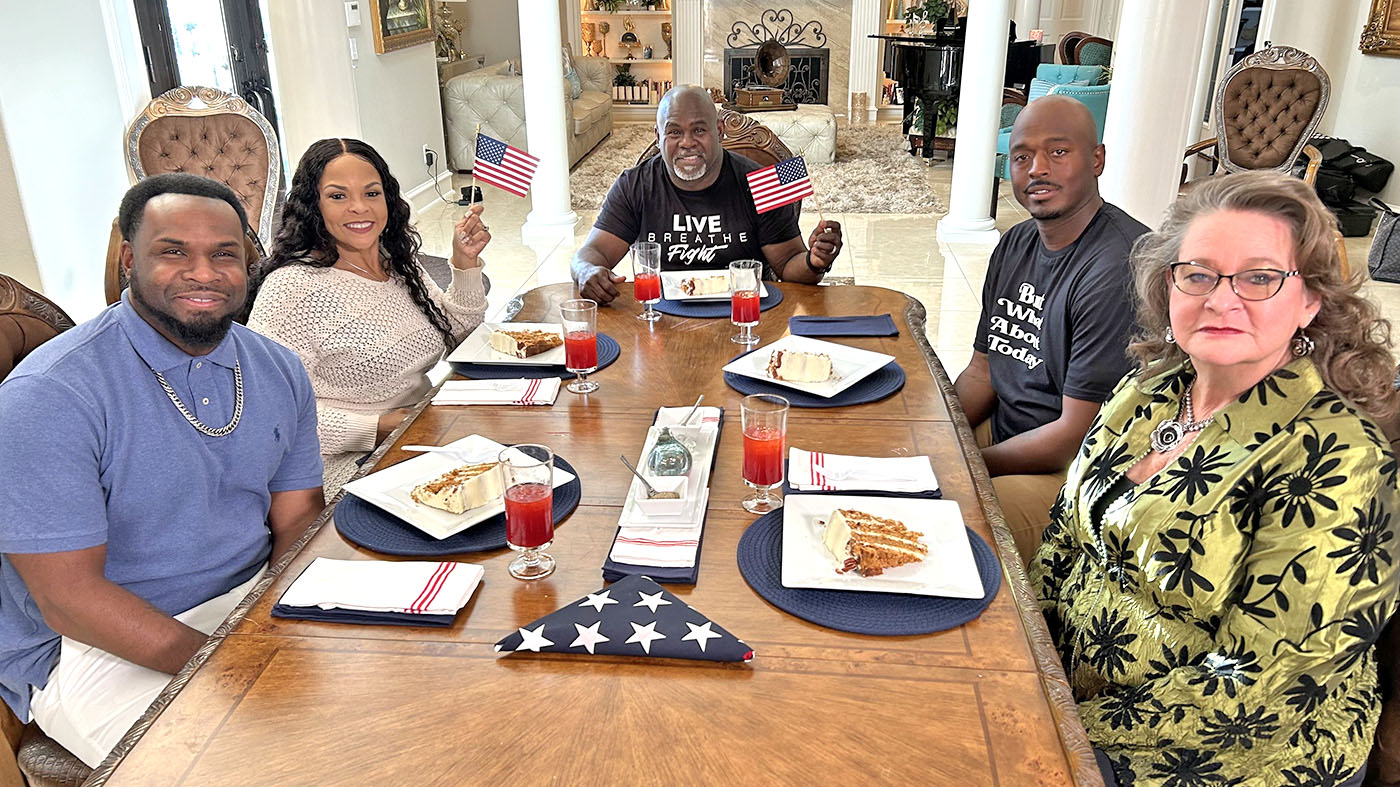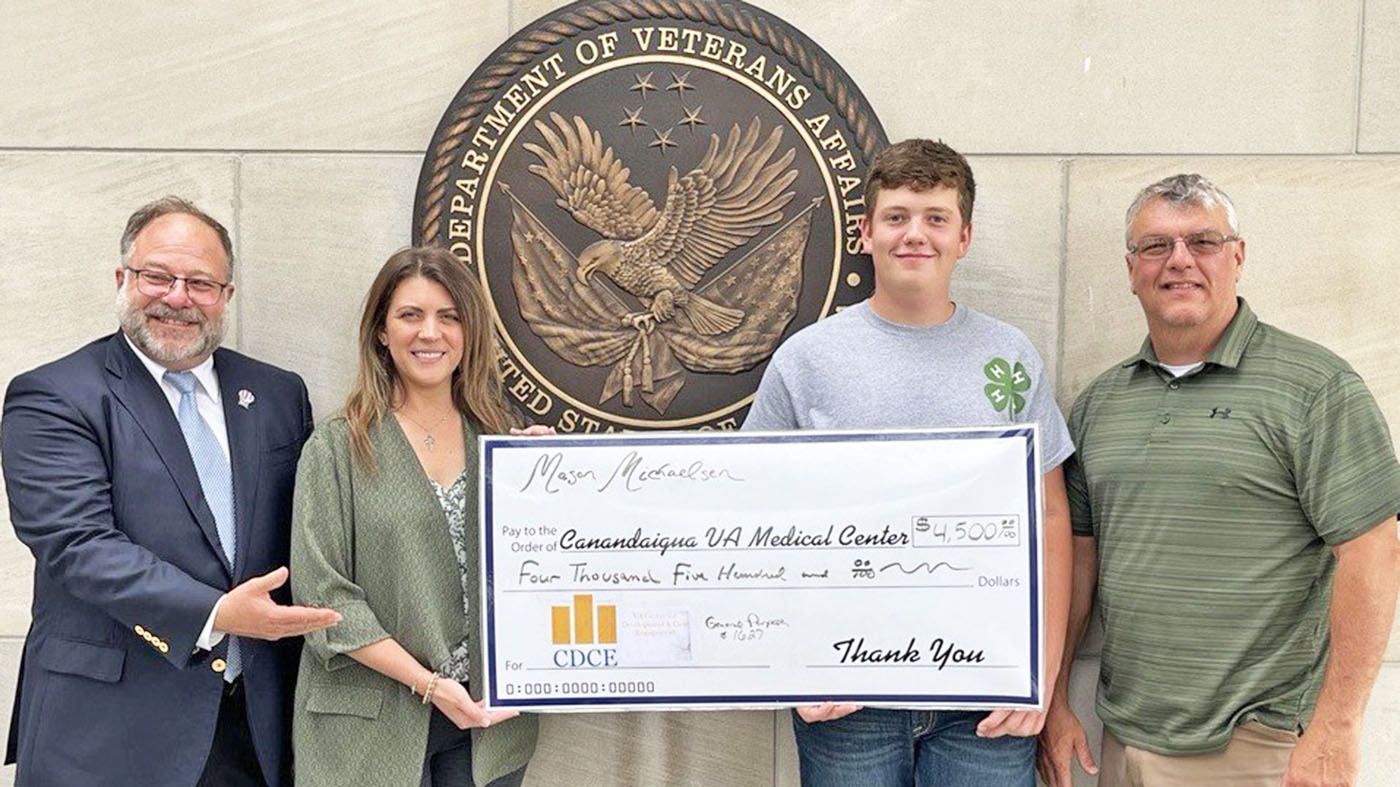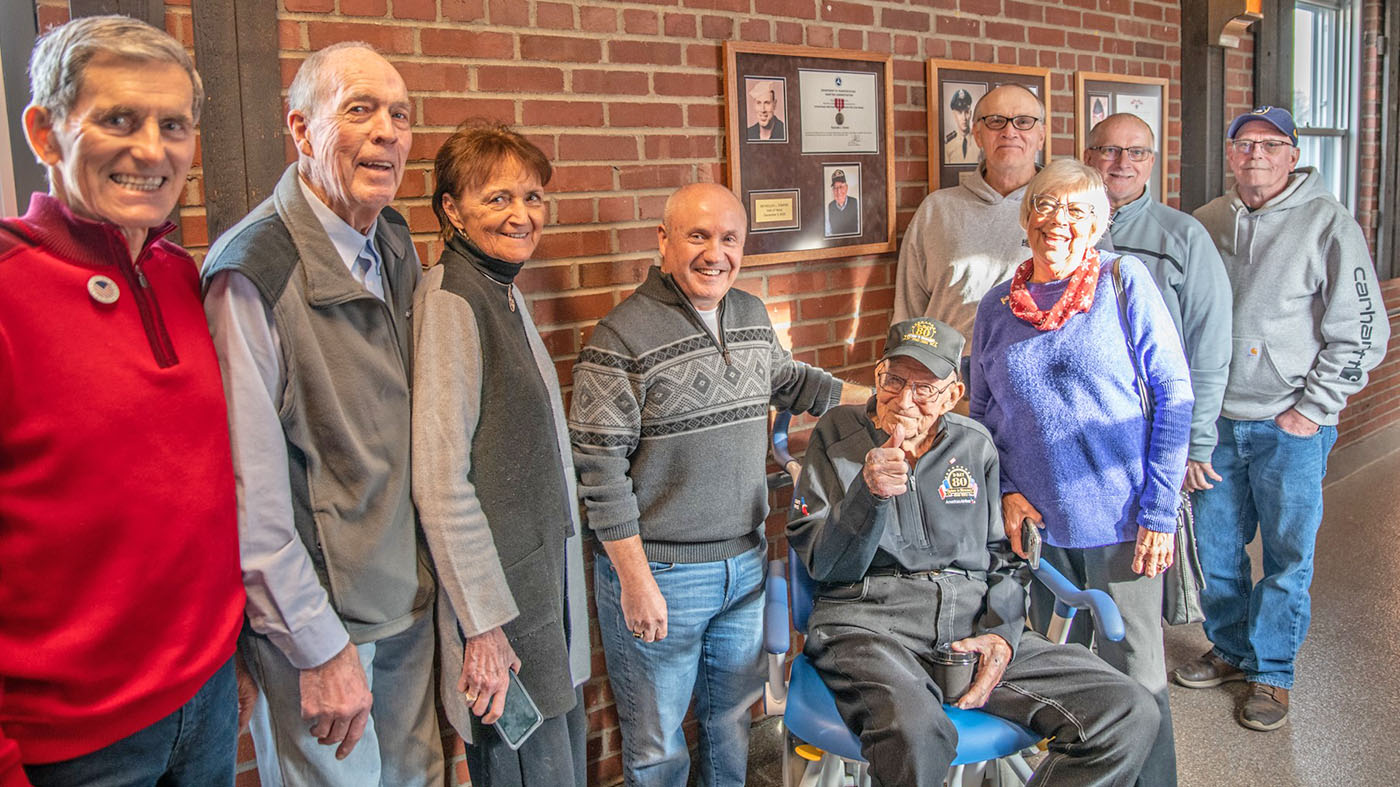Since 2014, VA has sponsored PTSD Awareness Month to educate the public on the mental health condition that affects an estimated 6 out of 100 Americans and 7 out of 100 Veterans.
PTSD is a mental health condition that some people develop after experiencing or witnessing a life-threatening or traumatic event. PTSD can cause distress and interfere with functioning, making everyday routines—like going to the grocery store, pumping gas, watching fireworks, or even hugging a friend—seem impossible. PTSD presents itself in many ways, but common symptoms include flashbacks, nightmares, detachment, avoidance and feeling keyed up or on guard.
If you find yourself struggling with thoughts about suicide, the 988 (press 1) call line is there to help. You can also text 838255 or chat online with the Veterans Crisis Line. This free, confidential resource offers support from trained professionals when you need it.
Having PTSD can lead to a sense of isolation and hopelessness. But there is hope for Veterans—PTSD is a treatable disorder, and VA providers can help. VA offers a variety of evidence-based therapeutic treatment options.
- Cognitive Processing Therapy (CPT)—one of the most effective treatments for PTSD—focuses on teaching people to reframe negative thoughts about the trauma. People may believe they are to blame for what happened or that the world is a dangerous place. These kinds of thoughts keep people stuck in their PTSD and cause them to miss out on things they used to enjoy. CPT teaches people more helpful ways to think about their trauma. The therapy takes place once a week over about 12 weeks, but can also be done daily.
- Prolonged Exposure (PE)—one of the most effective treatments for PTSD—teaches people how to gain control by facing their fears and talking through the trauma. People with PTSD often try to avoid memories and activities that remind them of the trauma. This can help them feel better in the moment, but not in the long term. Avoiding these feelings and situations actually keeps people from recovering from PTSD. By talking about the trauma and confronting safe situations that have been avoided, people can decrease their PTSD symptoms and regain more control of their life. The therapy takes place once a week over 8-15 weeks, but can also be done daily.

- Eye Movement Desensitization and Reprocessing (EMDR)—one of the most effective treatments for PTSD—focuses on helping people process their trauma. Processing the trauma can allow them to start to heal. In EMDR, people will pay attention to a back-and-forth movement or sound while they call to mind the trauma and any thoughts or physical feelings that come with it. The back-and-forth movement helps people to stay in the present while allowing the brain to process information from the past and bring in new ways of feeling about the event. The therapy takes place once a week over 12-18 weeks, but can also be done daily. These therapies have been proven successful in decreasing PTSD symptoms in Veteran patients so the symptoms no longer interfere with Veterans’ everyday lives. These treatments are available to Veterans at locations across the country.
Additional studies
VA is committed to high-quality research that safely promotes the health of our nation’s Veterans. In line with this goal, as announced in January, VA plans to conduct additional studies under stringent protocols at various facilities to evaluate if psychotherapy—in combination with compounds such as MDMA and psilocybin—are effective for treating Veterans with post-traumatic stress disorder and other mental health conditions. VA may provide agency research funding to larger studies investigating these novel therapies, including those that involve novel ways of administering the therapy with the intent of achieving maximum benefit to Veterans, while minimizing risks.
Get Screened: National PTSD Screening Day is June 27
June 27 is National PTSD Screening Day. This is a day to spread awareness about the importance of self-screening. But screening is available year-round. If you or someone you love may have PTSD, take an online PTSD self-screen anytime on the VA website’s screen tool.
After the screening, Veterans can contact a health care provider to further discuss results and next steps.
PTSD resources
If you or someone you care about may have PTSD, access help and available resources from the National Center for PTSD.
I encourage Veterans to visit their local VA Medical Center or VA clinic and seek treatment for PTSD. VA health care providers are not only experts in PTSD, but they know and understand PTSD symptoms in Veterans.
Topics in this story
More Stories
Mann Family Dinner episode discusses resources to address many of life’s challenges through VA’s Don’t Wait, Reach Out campaign.
Teenager Mason Michaelson wanted to auction rabbits. His grandfather, a World War Two Veteran, suggested he give back to Veterans.
Veteran Reynolds Tomter, an inductee in the Hall of Heroes, served in the Merchant Marines in WWII.







I have been trying to schedule an appt with Viera. VA. and havent had a call back. Since i transferred from the phx VA back in may
I’m suffering from PTSD and have tried to live a norma life, whatever that means. I’ve had many. many different jobs over the years but finally found a home with a non -profit veterans’ organization called Workshops For Warriors. I loved the people I worked for and with. I was their master election. I had an appointment at the VA hospital in San Diego. I was told that I needed surgery on my Carotid artery. I was never told they used the wrong doctor and a serious mistake was made. Now the right side of my neck and collar bone sticks out, my right shoulder is lower than my left, lump between shoulder blade and collar bone, I can’t raise my right arm and I had to leave my family in another country as I was living in my car. All my claims for disability have been denied. However the VA asked me to take an experimental for something I don’t have and to subject myself to electric shock to my brain. How dare the VA use Veterans as Guiney pigs. They took away my ability to work and support my family.. If you think the VA is here to help you, your sadly mistaken. F the VA. For more of my story email me
Stop KILLING Veterans with this propaganda of a reality that does not actually exist within ANY VA!
Ptsd is something you can only understand by experiencing the trauma. The hell I go through can not be understood by educated bookbworms.
How do you cure constant recurring nightmares of a village of innocent civilians napalmed because you could not call off the jets you called in thinking you were going to wipe out your enemies. Many, 3 or 4 per week, nightmares of horrific events you caused because you were just doing what you were trained and expected to do begin as soon as you enter rem sleep. Sad thing is that you were given an early honorable hardship discharge if you did not apply for disability and you were shown orders sending you back to the scene of your crimes if you did seek help because what you did was a secret.
I’d advise anyone who even thinks they suffer from PTSD to seek help. Therapy can be an absolute life changer
I can relate. Suppressing memories of past exposure to accidents involving the less fortunate are always kept at bay. The vision of the face of one recovery haunts me knowing he had a wife and children. The act of recovery, lifting the stiff body into the skiff we were in and losing my cookies. Returning to the station with everyone quiet about what had happened…yeah, it sucks. I still see that face with the small crabs around the collar of his shirt and in his beard.
I think the VA and others give out PTSD too easily.
That BS, I went to VA 4 times for ptsd and each time the the clerk did not have time for me , said I am on the phone come back another time, and every time I had a Dr appointment they ask me I said yes but would not send to a doctor . I also called the office and would not return my call. . If WWII soldiers put up with it I guess I can.
Do you address PTSD symptoms in the wife of a retired Navy Cdr ? My husband, Cdr. Joel Sargent passed on March 11, 2024. I have been diagnosed locally as having PTSD. Do you also help with care for the wife of a deceased veteran?
Since 1980 I have lived with PTSD but self medicated with alcohol and when I became sober on august 10th 2011
7 years into my sobriety I started to have nightmares/panic attacks/ anxiety/insomnia/burst of fear/anger!
I went to the VA and was diagnosed with PTSD that’s when we discovered that it had been since my service experience back in 1980 !!!!
I have been receiving the BEST Support/therapy/treatment from the VA And I’m thankful for that because I’m learning how to live a better life using my learnings !!!!!
With that said I don’t think that the statements below this article should discredit the VA !!!! Veterans need someone to take blame and instead of trying to get congressional/ congress to keep their promises to us veterans you are busy complaining!!!!!
GET TREATMENT!!!!!
Nothing that the VA does regarding PTSD works for the veteran it just makes the VA sound and feel good, the entire medical etc staff have no training in dealing with veteran with PTSD and labels them as aggressive, hostile etc this is the truth about the VA and PTSD, from a combat veteran with PTSD this is the truth, I doubt they will publish this comment. Nothing works for PTSD its all inside you the veteran and your family period
If you’re dealing with PTSD, the last place you want to go is the VA in Battle Creek Michigan. They are incompetent.
VA do just all us sorry they’re JACK-SS
I have PTSD from 1980 I have nightmares been crock on neck! I still have them now! I’m 67 years older! This discharge USA Army ? in in in 1980 ! stills now there hope for us not VA anywhere we help each other out of problems? Va gave me medicine to take I was in 2015 I weigh 350 Pounds! I off medicine and to 135 pounds again! Right now years 2024
Iti’s Medical, not psychological! Really…. “NMH” = “Neurally Mediated hypotension” is not “AIYH”
I am not sure if I have PTSD, despite a feeling of exploding in anger over little things and feel so dam alone.
I feel ashamed and scared of judgement from others.
I look at any assessment as opening a door to a part of me – and I freeze.
I will take a hard look at this dam fear.
I feel that I do need help.
Greg Vasquez
I pray one day the protocol changes for our veterans with PTSD AND TBI. THERE IS NO ACCOUNTABILITY My combat vet God love his heart has nevervtsken one medication or sought our recommendations of intense counseling. He’s in denial and i can’t help him. We hv been married 16 years. He left me for the 5th time on mother’s day and filed for divorce. My son and myself are completely broken and scared. We deeply love him so much but hrs gone. He absolutely hates every fiber of me
He actually believes this narrative that he has of me. It’s unbearable . I want my husband help but naturally everything is fine at his appointments. PLEASE VA include family members for a complete assessment and actually test blood work for med pt has been prescribed. 16 years itscall be discarded of. I married him 6month his return from deployment. Ive watched EVERY step Of this nasty disease now I’ve lost my spouse.
It’s MEDICAL… “NMH” = “Neurally Mediated Hypotension… not psychological… must avoid Triggers, especially ‘Adrenaline Hits’. Also, his Anger is unprocessed Grieving, and he’s projecting it on you, Blaming (yet another module of The Grieving Process he’s boomeranging among), as the safe person he knows will love him unconditionally. But don’t have to accept unacceptable behaviors. There are resources…
The VA waits so long to provide help that the primary symptoms get worse affecting the secondary symptoms. For instance during covid & after covid the VA was not sending disabled veterans through community care (cc) for over a year and after needed confirmed at least 14days no covid reports. The last cc visit i had in 2024 i was in a small space and the doctor was all in my face about africa!? When i had to gtfo bc i was about to be triggered the doctor almost tried to block the door exit. If civilians really understood ptsd & triggers then they’d understand the true threat which is enraging a war veteran to be threatened and needing to feel safe again and having to do whatever is needed to get to that safe point. I really do believe that civilians go out of their way to trigger service connected veterans to verify what happens if triggered and that should be a specific crime thats not related to emotional abuse or harassment. When i try to do small group therapy with other random veterans that i’ve never served with i dont know you, its about service measurements and accolades which idgaf about the only thing that matters is the mission. Their are veterans out there that think being station in new mexico is considered being deployed get tha fck out of here. Thats not deployment thats training. The VA takes too long to help its disabled war veterans, the va doesn’t support thc federally even though the thc helps with ptsd, spine & nerve damage, the va doesn’t support emails or texting even if the screaming hold music on VA phones affects my tinnitus and the long phone waits stress me out just so someone can get on the line to disconnect the line, fck you im tryin to get real va help. the va doesn’t trust its own my healthe vet portal messaging even though it says secured but all the va departments don’t want to email the disabled veteran and says va portal message not secured, da fck! the va’s advocate number doesn’t let you leave a voicemail anymore so it just rings nobody answers. There is soo much the VA has to do to catch up bc it waited soo long to identify help and how to use that help for its disabled veterans. Still in 2024 past war veterans are still waiting to receive that good help the va talks about hurry up and wait! Oh yea the va suicide hotline is garbage getting into arguments bc the reps think they can psychologically identify your issues instead of just listening without judgement and even after everything the suicide hotline hears they still ask robot sign off questions that can strip whatever freedom you fought for. Stay alert, follow the sop and always watch ur back bc no civilian is gonna watch ur six.
I’ve had PTSD since 1991. I feel like I’ve seen it and pretty much done it all.
I’ve been taking meds for many years now. I went through three PTSD classes. The last class I went to, they discussed medications.
The meds we take , do not always work. I can’t drink anymore, due to almost dying from it. So, I now smoke weed to help the medication, keep me at a controlled level.
It’s way past time to legalize it.
Yet, those of us with chronic PTSD get poorly treated and don’t get all the proper care and help we need. but will get reported to VA disciplinary board in a heat beat and no way to defend ourselves. Admin people at these facilities are poorly, if ever trained to understand those of us suffering with PTSD. We then get accused unjust of things. More in house training need done even to Directors and Chief of Staff who have no clue about PTSD Veterans!!!
You all say that you want to help but your treatment is garbage… And veterans are put on a waiting list to be treated. To no avail they’re not cured. Why don’t you open your doors to illegal immigrants. I see we love them.. more than we love our veterans. You guys are there just for a paycheck and you’re mostly nonvets. And I had a primary doctor that was terrible. She should have been fired. But she’s still there unfortunately with the VA earning a paycheck. I’ve been using a private doctor. I’ll pay out of my pocket
Leave those poor immigrants alone buddy.
Amen to that brother I had a primary care Doctor that didn’t care for Veterans at all only cared about his photos on the wall of his office of him and his family in China thank God he was old enough to retire and he did. In my opinion the VA Admin should hire more Veterans less non-Veterans if that is possible.
Im currently doing EMDR sessions. It eases the trauma and the pain of living with trauma but its not a cure.
After my VA Dr. diagnosed me in 2019 I still wait for a settlement. The VA sends you to outside interviewers. The Judge finally made the decision in 2023 that the case should be reviewed and ANY doubt should be given to the Vet. I then had to go to another outside interviewer. He never ask me for any ID or any informal questions but just went to the computer questions. That was in July 2023. Still no response.
I’m always hyper vigilant, locking doors, closing blinds, listening, etc
Did they help you or you still hyper vigilant I assume they didn’t help you obviously. All the best. I suggest you get a private doctor. Try community Care.
Psychiatrist said I don’t have PTSD
I’m always hyper vigilant, locking doors, closing blinds, etc.
Again …VA these are some of the best topics addressing PTSD that I have seen in a while, & all of the emphasis, trials that VA are making available to all Veterans…Thanks VA